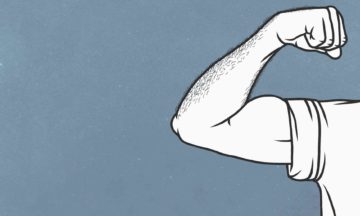Tim Adams in The Guardian:
 A few years ago, I sat through an enjoyable lecture by the artist Grayson Perry about the familiar evils of rigid ideas of masculinity: war, imperialism, misogyny, alienation. The lecture was part of a festival called Being a Man (or BAM! for less evolved members of the tribe). Perry ended his comments with a scribbled series of demands on a whiteboard for a new bill of men’s rights, with which it was hard to argue. “We men ask ourselves and each other for the following: the right to be vulnerable, to be uncertain, to be wrong, to be intuitive, the right not to know, to be flexible and not to be ashamed.” He insisted that men sit down and mostly talk quietly to achieve these aims and was given a rousing standing ovation.
A few years ago, I sat through an enjoyable lecture by the artist Grayson Perry about the familiar evils of rigid ideas of masculinity: war, imperialism, misogyny, alienation. The lecture was part of a festival called Being a Man (or BAM! for less evolved members of the tribe). Perry ended his comments with a scribbled series of demands on a whiteboard for a new bill of men’s rights, with which it was hard to argue. “We men ask ourselves and each other for the following: the right to be vulnerable, to be uncertain, to be wrong, to be intuitive, the right not to know, to be flexible and not to be ashamed.” He insisted that men sit down and mostly talk quietly to achieve these aims and was given a rousing standing ovation.
The need for men to be vulnerable, to open up about their insecurities – to become, in cliched terms, more like women – is certainly one antidote to what has become widely understood as the current crisis in masculinity. Thinking about that lecture afterwards, though, it felt a bit limited as a solution. There is no question that mansplainers and manspreaders could do with a fatal dose of humility and doubt. But what about that generation of young men who already feel marginalised from a consumer society, who have been denied most of the markers that traditionally help boys become men: decent jobs, responsible dads, stable homes of their own and, often in consequence, meaningful adult relationships. Would opening up about doubt and vulnerability in itself allow them to achieve self-worth and purpose?
More here.
